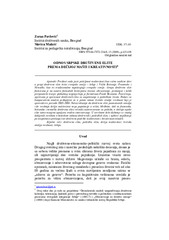Приказ основних података о документу
Odnos srpske društvene elite prema dečijoj mašti i kreativnosti
Attitude of serbian social elite towards child imagination and creativity
| dc.contributor | Gojkov, Grozdanka | |
| dc.creator | Pavlović, Zoran | |
| dc.creator | Maksić, Slavica | |
| dc.date.accessioned | 2022-02-18T11:01:14Z | |
| dc.date.available | 2022-02-18T11:01:14Z | |
| dc.date.issued | 2009 | |
| dc.identifier.isbn | 978-86-7372-114-9 | |
| dc.identifier.uri | http://ipir.ipisr.org.rs/handle/123456789/752 | |
| dc.description.abstract | Predmet rada jeste poželjnost maštovitosti kao važne osobine dece u grupi društvene elite četiri evropske zemlje - Srbije i Velike Britanije, Francuske i Nemačke, kao tri tradicionalno najuticajnije evropske zemlje. Grupa društvene elite formirana je na osnovu formalnih kriterijuma (uzrast, obrazovanje, primanja) i nekih pretpostavki teorije globalnog mnjenja koju je formulisao Frank Rusciano. Pored toga, ispitivana je spremnost društvenih elita za angažovanje u političkom životu. Podaci za komparativnu analizu prikupljeni su u petom talasu Svetske studije vrednosti koji je sproveden u periodu 2005-2008. Nalazi ukazuju da društvene elite posmatranih zemalja više vrednuju dečiju maštovitost nego populacije u celini. Međutim, dok su francuska, britanska i nemačka društvena elita većinski zainteresovane za politiku, u slučaju srpske elite samo manjina ispoljava ovakvo interesovanje. U završnom delu diskutuje se značaj dobijenih rezultata u kontekstu odnosa društvenih i političkih elita, i njihove implikacije po mogućnosti pružanja šire društvene podrške maštovitosti i kreativnosti mladih. | sr |
| dc.description.abstract | Subject of the paper is preference of imagination as an important child quality in the group of social elite in four European countries - Serbia and Great Britain, France and Germany, as three traditionally the most influential European countries. The group of social elite is defined by formal criteria (age, education, income) and certain assumptions of global opinion theory formulated by Frank Rusciano. In addition to this, we studied the readiness of social elites for political engagement. Data for comparative analyses are taken from the fifth wave of World Values Survey, conducted in the period 2005-2008. The findings suggest that social elites of the countries in question evaluate child imagination higher than general population as a whole. However, while the majority of French, British and German social elite is interested in politics, only a minority of Serbian elite has the same interest. In the final part, the relevance of obtained results is discussed in the framework of the relation between social and political elites, as well as their implications for providing broader social support to child imagination and creativity. | sr |
| dc.language.iso | sr | sr |
| dc.publisher | Vršac : Visoka škola strukovnih studija za vaspitače "Mihailo Palov" | sr |
| dc.relation | info:eu-repo/grantAgreement/MESTD/MPN2006-2010/149017/RS// | sr |
| dc.relation | info:eu-repo/grantAgreement/MESTD/MPN2006-2010/149001/RS// | sr |
| dc.rights | openAccess | sr |
| dc.source | Daroviti i društvena elita | sr |
| dc.subject | društvena elita | sr |
| dc.subject | politička elita | sr |
| dc.subject | dečija maštovitost | sr |
| dc.subject | Svetska studija vrednosti | sr |
| dc.subject | Srbija | sr |
| dc.subject | social elite | sr |
| dc.subject | political elite | sr |
| dc.subject | child imagination | sr |
| dc.subject | World Values Survey | sr |
| dc.subject | Serbia | sr |
| dc.title | Odnos srpske društvene elite prema dečijoj mašti i kreativnosti | sr |
| dc.title | Attitude of serbian social elite towards child imagination and creativity | sr |
| dc.type | bookPart | sr |
| dc.rights.license | ARR | sr |
| dc.citation.epage | 439 | |
| dc.citation.issue | 15 | |
| dc.citation.spage | 425 | |
| dc.description.other | [http://www.uskolavrsac.edu.rs/Novi%20sajt%202010/Dokumenta/Izdanja/15%20Okrugli%20sto/Pavlovic%20-%20Maksic%20-%2038.pdf ] | |
| dc.identifier.fulltext | http://ipir.ipisr.org.rs/bitstream/id/2287/bitstream_2287.pdf | |
| dc.identifier.rcub | https://hdl.handle.net/21.15107/rcub_ipir_752 | |
| dc.type.version | publishedVersion | sr |

